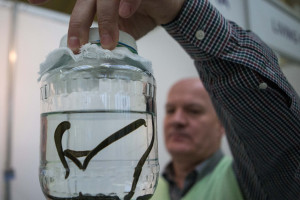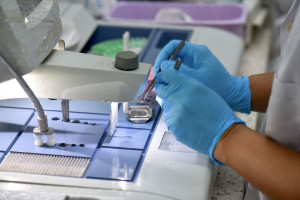The risk of breast cancer recurrence can be reduced by 25 percent. "Chance for permanent cure"

- The risk of recurrence of early breast cancer in the case of hormone-dependent and HER2-negative cancers may persist for many years – sometimes it occurs even 10 or more years after the end of treatment - says Dr. Aleksandra Konieczna
- The drug program includes abemaciclib, which is intended for patients with positive lymph nodes and a high risk of recurrence. It reduces this risk by 25-30% compared to hormone therapy alone, he explains.
- Oncologists and patients are now hoping for reimbursement for ribociclib, which can also be used in patients without lymph node metastases. The drug is approved for use by the EMA, but it is not yet reimbursed in Poland, she adds.
"Early breast cancer is a form of cancer in which the disease process has not yet progressed to distant metastases. In such cases, radical treatment is possible, with the intention of complete cure. This usually refers to breast cancer in stages I to IIIa, sometimes IIIb. In the treatment of early breast cancer, adjuvant therapy—chemotherapy, hormone therapy, or radiotherapy—is crucial, as it aims to reduce the risk of recurrence," says Dr. Aleksandra Konieczna from the Breast Cancer and Reconstructive Surgery Clinic of the National Institute of Oncology – National Research Institute in Warsaw.
It clarifies that early breast cancer is limited to the breast itself and may also involve regional lymph nodes, but has no evidence of distant spread. Early breast cancer accounts for approximately 80% of all breast cancer diagnoses.
"The risk of recurrence in early breast cancer depends on its biological subtype. In the case of so-called luminal cancers, meaning hormone-dependent and HER2-negative, the risk of recurrence can persist for many years – sometimes even 10 or more years after treatment. In the mildest cases, this affects about 10% of patients, but in others it can reach as high as 30–40% . In HER2-positive and so-called triple-negative breast cancers (TNBC), the risk of recurrence is usually higher, and if it does occur, it occurs more frequently, even within 2–3 years of diagnosis," explains the expert.
He emphasizes that the risk of recurrence is influenced not only by the biological subtypes of cancer but also by other characteristics of the tumor—both biological and clinical. This risk increases with, among other factors, the initial tumor size, higher grade of malignancy, and lymph node involvement.
Recurrence can occur locally – in the area of the operated breast or in regional lymph nodes – and then radical re-treatment is often possible. However, distant recurrence, in the form of metastases to other organs, also occurs, which raises the greatest concern for both patients and physicians.
These drugs are highly effective" CDK4/6 inhibitors, used in conjunction with hormone therapy, have been shown to be highly effective in reducing the risk of recurrence in patients with hormone-dependent, HER2-negative breast cancer. Depending on individual risk factors, doctors can choose different drugs from this group, tailoring therapy to the needs of a specific patient," notes Dr. Konieczna.
"Since April of this year, abemaciclib has been available in the drug program, intended for patients with positive lymph nodes and a high risk of recurrence. It reduces this risk by 25-30% compared to hormone therapy alone," he reminds.
"The second drug in this indication from the CDK4/6 inhibitor group is ribociclib, approved for use by the European Medicines Agency (EMA), although currently not reimbursed in Poland. It can be used in patients with hormone-dependent, HER2-negative, early breast cancer at high risk of recurrence, including those without lymph node metastases. Data from the NATALEE study show that adding ribociclib to hormone therapy reduced the risk of invasive breast cancer recurrence by 25% compared to hormone therapy alone," explains the specialist.
He says oncologists are very hopeful that this drug will be reimbursed because ribociclib can be used in a wider group of patients than abemaciclib. It can also be administered to women who do not have positive lymph nodes but for whom other biological or clinical factors indicate an increased risk of disease recurrence.
" Administering ribociclib in combination with hormone therapy can reduce the risk of recurrence in these patients by up to a quarter , which is why oncologists are eagerly awaiting the possibility of including this therapy in the reimbursement system. Patients themselves are also counting on it. Instead of living with the constant fear of disease recurrence, often years later and in the form of distant metastases, they would like to feel that they have done everything they can to increase their chances of a permanent cure," emphasizes Dr. Konieczna.
Better quality of life for patientsThe expert reminds us that CDK4/6 inhibitors are used not only in early breast cancer but also in the treatment of advanced stages . These drugs are administered orally and are very well tolerated, allowing patients to function normally and lead active lives – professionally, family-wise, and socially. Compared to chemotherapy, therapies using CDK4/6 inhibitors significantly improve patients' quality of life while also being highly effective.
"The latest list of reimbursed drugs, effective July 1st of this year, is another nod to breast cancer patients. Their therapeutic needs have been greatly addressed in recent years, which greatly pleases the oncology community. We hope that ribociclib will soon be included in the drug program—a drug that could expand treatment options with another effective option for patients with early breast cancer," adds Dr. Konieczna.
Copyrighted material - reprint rules are specified in the regulations .
rynekzdrowia












